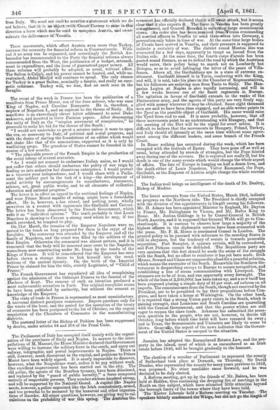The event of the week in France has been the
publication of a manifesto from Prince Murat, son of the beau sabreur, who was once King of Naples, and Caroline Bonaparte. He is, therefore, a nephew of Napoleon I., and an aspirant to the throne of Sicily. His manifesto is an exceedingly clever letter addressed to some Duke unknown, and inserted in three Parisian papers. After denouncing the unity of Italy as the "utopian movement of conspiracies," he proceeds to make his bid for the throne of the South :
"I would not undertake so great a mission unless it were to open the era, so necessary to Italy, of political and social progress, and with the desire of casting the foundations of an edifice which would not shake like that of the annexations, supported as it is only by vacillating props. The grandeur of States cannot be founded in the course of a few months.
" The admirable power of the French Empire is the production of the social labour of several centuries.
"As I would not consent to embarrass Italian union, so I would not suffer that others should embarrass the policy of our reign by leading us into seductive but disastrous enterprises. I would protect as a treasure your independence, and I would share with a Parlia- ment the noblest part in the task of a king—the development of social activity by encouragements to manufactures, commerce, science, art, great public works, and to all elements of collective education and national progress."
The letter is in effect an appeal to the sectional feelings of Naples, and were Prince Murat capable of ruling, might have a formidable effect. He is, however, a bon vivant, and nothing more, wholly powerless in a contest with opponents like Garibaldi and Cavour. The letter has been disavowed by the French Government, which calls it an "individual opinion." The truth probably is that Louis Napoleen is showing to Cavour a strong card which he may, if too much provoked, be tempted to play. On 31st March, the remains of the Emperor Napoleon were re; moved to the tomb so long prepared for them in the crypt of the Invalides. The ceremony was attended by the Emperor and all the family of Napoleon, and the court was filled by the soldiers of the first Empire. Otherwise the cremonial was almost private, and it is rumoured that the body will be removed once more to the Napoleon mausoleum now constructing under St. Denis by the tombs of the Kings of France. It will be remembered that the Emperor has once before shown a strange desire to link himself into the recol- lections of the ancient dynasty. On the birth of the Imperial Prince he claimed for him the title, strictly Legitimist, of " Child of France."
The French Government has repudiated all idea of complaining against the admission of the Orleanist Princes to the funeral of the Duchess of Kent. The rumour of such an intention produced a most unfavourable sensation in Paris. The original complaint seems to have been published by authority, but without the consent or knowledge of the Emperor. The state of trade in France is represented as most unsatisfactory. A universal distrust paralyzes commerce. Buyers purchase only for the wants of the hour, and the period for the operation of the treaty of commerce has been postponed to the 1st of October, on the urgent requisition of the Chambers of Commerce in the manufacturing districts.
The pastoral letter of the Bishop of Poitiers has been suppressed by decree, under articles 84 and 204 of the Penal Code.






























 Previous page
Previous page